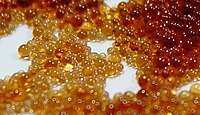
Photo from wikipedia
Tea polyphenols (TPPs), as the most important functional component in tea extract, are easily contaminated by many heavy metals during tea processing, transportation and storage. TPPs with heavy metals can… Click to show full abstract
Tea polyphenols (TPPs), as the most important functional component in tea extract, are easily contaminated by many heavy metals during tea processing, transportation and storage. TPPs with heavy metals can cause serious health problems and economic losses. In this study, to efficiently remove heavy metals from TPPs without affecting their active compounds and antioxidant functions, we prepared the amino-functionalized modified silica gel (AFSG) to remove Pb, Cu and Cd from TPPs, and determined removal rate of heavy metals, total polyphenolic content (TPC) and antioxidant activity of TPPs before and after adsorption. The static adsorption experiments showed that the adsorption isotherms were consistent with Langmuir model, in which the maximum sorption capacities of Pb, Cu and Cd were 140.23, 100.75 and 48.03 mg/g (25 °C, pH 5.0), respectively. Compared with before adsorption, the contents of Pb, Cu and Cd in 3 TPPs samples decreased significantly after adsorption on AFSG column (p < 0.01). However, the TPC and antioxidant capacity of the 3 TPPs samples had no significant effect before and after adsorption (p > 0.05). Meanwhile, the desorption and regeneration experiment showed that after 6 times of cyclic adsorption, the removal ability of Pb, Cu and Cd in TPPs by AFSG column could still reach 98.1%, 99.59% and 99.78%, respectively. Therefore, these results suggested that AFSG column could effectively remove heavy metals from TPPs without affecting the TPC and its antioxidant activity, it has potential applications in the removal and detection of heavy metals in TPPs.
Journal Title: Journal of Food Measurement and Characterization
Year Published: 2020
Link to full text (if available)
Share on Social Media: Sign Up to like & get
recommendations!